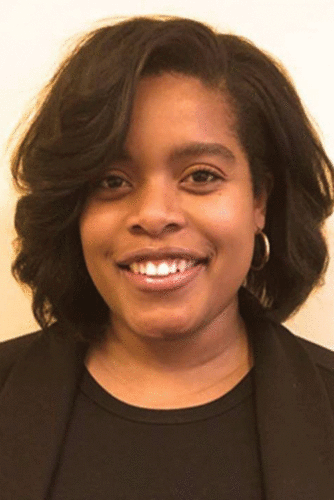
Like the people she serves, Christina Bradley ’08 lives with mental health issues. The non-profit leader has depression—and she says it’s one of the reasons she’s good at what she does.
“It’s that understanding that allows me to help,” says Bradley, who manages support programs for the National Alliance on Mental Illness (NAMI) of New York City. “That’s what we’re all in need of: understanding. And I’ve learned from the people I serve how to help myself better.”
With a bachelor’s degree in Psychology from Haverford College and a Master of Health Sciences from Johns Hopkins University, she has led research funded by the National Institutes of Health and managed over 150 crisis centers serving nearly 2 million suicidal callers per year. Her work and research have often focused on communities of color.
“I’m a Black woman, so I have that lens,” she says, “but mental illness does not discriminate. It’s universal.”
Her journey with mental illness
When Bradley was 25, she had her first significant depressive episode. It didn’t come as a surprise to her.
She has a lot of family members with mental health issues and grew up witnessing many of their struggles. And with her psychology training, she knew she was near the average age for the onset of depression. Still, it changed her forever.
She had to figure out what type of treatment worked for her. And she had to let herself mourn the person she was before the onset of the illness.
“Mental illness is a journey, not a linear process, but recovery is possible,” she says.
Since that first episode, she has been able to live a stable, healthy, and productive life. And that’s her goal for the people she serves.
Her work has shown her that there are different barriers to that goal, depending on who you are and where you live. And those barriers seem to align with what she’s observed in her own family.
“There’s a tendency in the Black community to focus on physical health and to neglect emotional and mental health issues,” she says.
On one side of her family are Jamaican immigrants from the Bronx and on the other side are middle class white folks from Indianapolis. Despite these differences, Bradley saw mental illness on both sides of her family.
“I spent my whole life around people, on both sides of my family, who were struggling with depression, bipolar disorder, schizophrenia, and addiction. It all went undiagnosed and untreated.”
Now, she has a vision for a better mental health care system: Everyone is more aware of mental health issues at an earlier age, such that the stigma doesn’t prevent people—especially in communities of color—from getting the help they need.
Her vision for mental health care
Armed with her and her family’s history with mental illness and her graduate degree, Bradley is equipped to help others in their mental health journeys.
She has served the New York University School of Medicine and Langone Medical Center, Vibrant Emotional Health, the National Suicide Prevention Lifeline, and the U.S. Office of Presidential Correspondence under the Obama administration. She has conducted research in prisons, mental health courts, and hospitals. A native English-speaker and fluent Spanish-speaker, she uses her diverse language skills to reach as many people in need as possible.
“I have a lot of passion for this work,” she says. “There’s a lot of unmet need.”
In her current role at NAMI, she oversees the organization’s helpline and over 30 support groups and classes, which serve nearly 20,000 people per year. Her latest project during COVID-19 is a virtual support group called “Black Minds Matter.” It meets on the second and fourth Friday of the month from 6-7:30 p.m. Information on how to join can be found at naminyc.org.
“We promote the idea that you can recover,” she says, “and hope is an essential part of the process.”
Her love and appreciation for CA
Bradley’s own struggle with depression began years after she graduated from Colorado Academy. Nevertheless, she says, “CA was so crucial to where I am now.”
A CA student for Grades 7 through 12, she says her interest in public service was born in Middle School civics class with Nancy Landolfi and Upper School history class with Luis Terrazas. Her long track record of supporting others began there, as well, as she was a student mentor and volunteer tutor. Her experience as captain and #1 Singles Player for the CA Women’s Varsity Tennis Team under Coaches Bob Ulrich and Guy Garcia built her skills in leadership, teamwork, and self-discipline.
“CA is where I first practiced expressing myself and developing a voice,” she says. “The faculty, in the English Department in particular, pushed me to be curious, inquisitive, and rigorous. They were devoted to helping me excel. To this day, I appreciate that.”
And when she moved to New York City, two of her best friends from CA were there, too. Having a long-time friend there helped her feel at home and make the transition to the big city.
While she’s doing great in New York, she misses Colorado and CA all the time and could see herself coming back at some point.
“I have so many fond feelings for and memories of that place,” she says. “It’s the physical space itself, which is beautiful, green, and lush, as well the amazing CA community.”
